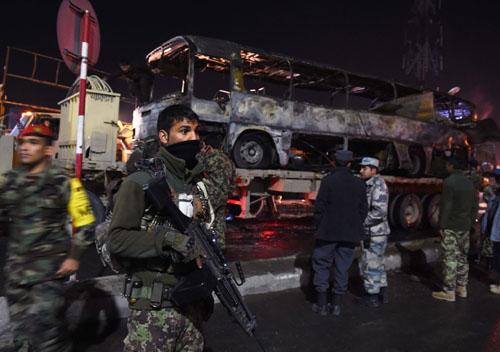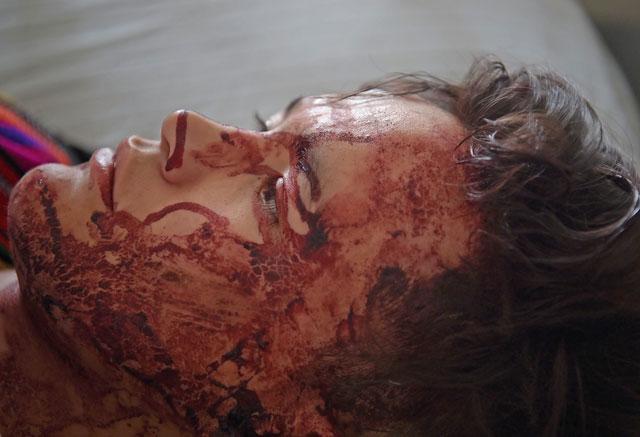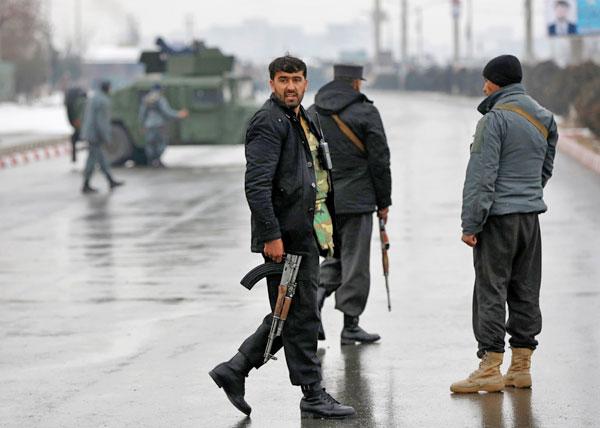You are here
Multiple attacks kill 20 in Afghanistan
By AFP - Dec 13,2014 - Last updated at Dec 13,2014

KABUL — Taliban insurgents killed at least 20 people in a series of gun and suicide attacks in Afghanistan on Saturday, underlining worsening security as US-led NATO forces end their combat mission in the country.
A suicide blast wrecked an Afghan military bus in Kabul, killing seven soldiers, while a senior court official was assassinated in the city and 12 Afghan mine clearance workers were gunned down in the south.
Two NATO soldiers were also killed on Friday in an attack in the east of Afghanistan, the International Security Assistance Force (ISAF) said in a statement, without identifying their nationality.
The Taliban claimed responsibility for all the attacks.
The latest bout of violence comes ahead of the official end of NATO’s war against the Taliban on December 31 after 13 years of fighting that has failed to thwart the Islamist insurgency.
The bloodshed has wrecked claims that the insurgency is weakening and has highlighted fears that Afghanistan could trip into a spiral of violence as the US-led military presence declines.
NATO’s force in Afghanistan will change at the end of the year from a combat mission to a support role, with troop numbers cut to about 12,500 — down from a peak of 130,000 in 2010.
On Saturday, a suicide bomber on foot detonated explosives next to the military bus in central Kabul, destroying the vehicle in one of the busiest parts of the city as people left work.
“The suicide attack on an Afghan army bus today killed seven and injured 18 more, including some civilians,” General Ayoub Salangi, the deputy interior minister, said.
The Taliban have often targeted buses that take government and military personnel to and from work everyday in Kabul, despite efforts by security forces to provide protection for the vulnerable vehicles.
Worsening security
Earlier in the day, Taliban gunmen shot dead a senior Supreme Court official in the city as he left his home.
Insurgents also killed 12 mine clearance workers in the restive southern province of Helmand in attack that President Ashraf Ghani condemned as “unjustifiable and un-Islamic”.
The Taliban have targeted de-mining projects before, beheading seven workers in the western province of Farah in 2011.
On Thursday, a Taliban suicide bomber blew himself up among the audience attending a performance at a French cultural centre in Kabul, killing one German national and wounding 15 others.
Other recent targets have included foreign guesthouses, a female Afghan member of parliament, a British embassy convoy and three members of a South African family killed when their compound was attacked.
Kabul has been hit by at least 12 suicide attacks in the last month.
US Defence Secretary Chuck Hagel said on a visit to Kabul a week ago that the upsurge showed “that the international community must not waver in its support for a stable, secure and prosperous Afghanistan”.
He insisted Afghanistan would not go the way of Iraq, where another US-trained army virtually collapsed in the face of an onslaught by Islamic State jihadists after American troops left the country in 2011.
But Afghan officials have expressed alarm over the challenge facing the local security forces who must increasingly tackle the insurgents without NATO military assistance.
Afghan soldiers and police have suffered soaring casualties, with more than 4,600 killed in the first 10 months of this year.
Ghani, who came to power in September, has vowed to bring peace to Afghanistan after decades of conflict, saying he is open to talks with any insurgent group.
Ghani finally emerged as president after signing a power-sharing deal with his poll rival Abdullah Abdullah.
The two men each claimed to have won fraud-tainted elections in a prolonged stand-off that caused political paralysis in Kabul and fanned instability nationwide.
Related Articles
NATO formally ended its war in Afghanistan on Sunday, holding a low-key ceremony in Kabul after 13 years of conflict that have left the country in the grip of worsening insurgent violence.
KABUL — A suicide bomber on Wednesday killed at least 26 people, many of them teenagers, after detonating a device among a crowd of people i
KABUL — Militants on Monday raided a military academy in Kabul, the Afghan capital, killing 11 soldiers, the fourth major attack in a spate



















